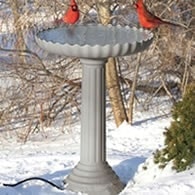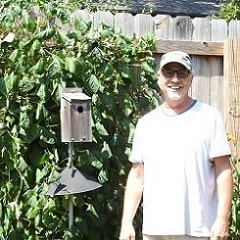Robin Nest On Bird Feeder
by Pat
(Oklahoma, USA)

Baby Robins in nest built on bird feeder
When you place a bird feeder in your yard to watch birds, you never think a Robin would build a nest on it in Spring.
That's what happened with Pat's feeder. Giving her family a front row seat to the wonder of nesting birds.
We had a Robin who built her nest this spring on the outside edge of our large wooden bird feeder.That's what happened with Pat's feeder. Giving her family a front row seat to the wonder of nesting birds.
We had always seen them in the past build in shrubs or low bushy trees, so this was a first for us..
We watched her build the nest and she even built a smaller, less organized one for the male on the other side of the feeder.
Once ready, she laid 4 eggs, sat on them until they hatched and we had the pleasure of watching her feed them and care for them for 2 weeks.
We knew they were close to leaving feeder nest, this past Sunday. My husband saw the mother "teaching" them how to find food yesterday.
She stayed very near the nest where the babies could see her and showed them how to peck for bugs.
Without anything in her mouth she repeatedly flew up to the nest (they had their mouths open, ready to eat) but she had nothing for them.
They were closely watching her every move.
This morning only 2 were in the nest, so we knew 2 had taken their leave. One more left mid-day and the final little one was gone this afternoon.
It was a joy to watch the entire process from beginning to 'end'.
I've learned since this nesting that the bird feeder that the robin used was like a covered ledge.
Seems that it is quite common for them to build nest on ledges that give them a stable platform and protection from the weather.
They even make what is called a robin nesting shelf you place under your houses overhang.
I've also learned I could place mealworms or a small dish of grape jelly in my "Robin Bird Feeder" and watch them eat. I might try that!
Enjoy your bird watching!
From Wild-Bird-Watching
Thanks Pat for your submission!
One thing I would like to expand on is your description of the female teaching the young to hunt for food.
What generally happens is, the adults begin to withhold food from the young when it's close to fledging time.
This encourages the young to fly towards the adults for food.
This is what you saw when the female was going to the nest with no food.
If the adults did not do this, the young would have no real reason to leave the nest. Hunger is a powerful incentive.
The male will actually continue to care for the young off and on for another week or two. In the meantime the female will start another nest.
Thanks for caring about our birds.

|

|

|

|
| Readers Digest Guide | Golden Guide | Your State Only | Nat-Geo Guide |
Comments for Robin Nest On Bird Feeder
|
||
|
||
|
Click here to add your own comments Join in and write your own page! It's easy to do. How? Simply click here to return to Robins. |




